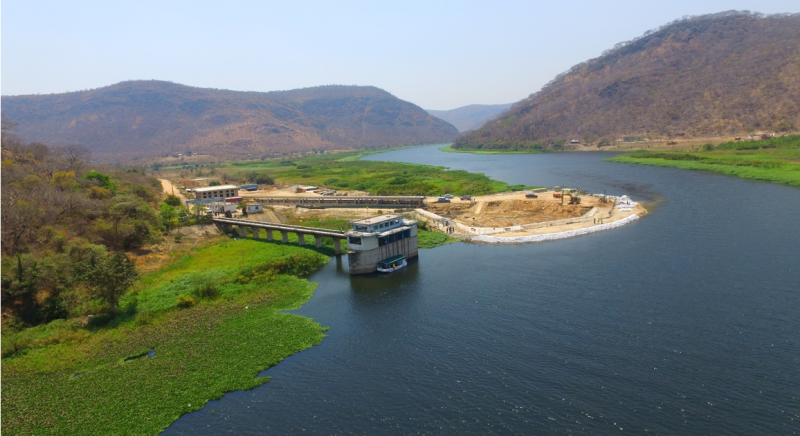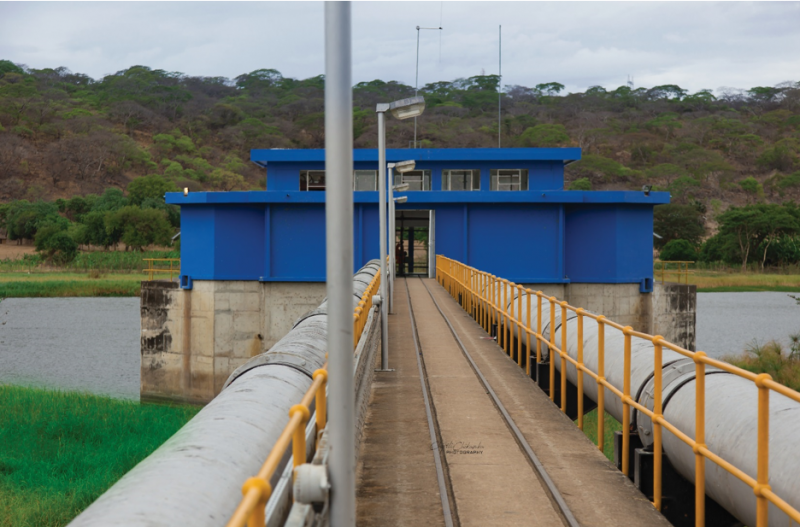
MCA-Zambia
The intake structure at the Iolanda water treatment plant was rehabilitated under the Zambia compact. MCC’s pilot of the CRIDA approach examined investment decisions at Iolanda in light of uncertainties about future water availability.
Development practitioners face big challenges in their efforts to reduce poverty. One strategy for overcoming these hurdles is to explore innovative, evidence-based approaches to help ensure that foreign aid is effective.
That’s why MCC recently hosted collaborators, colleagues, and water sector professionals from more than a dozen organizations for the U.S. launch of a new publication, CRIDA: collaborative water resources planning for an uncertain future. Climate Risk Informed Decision Analysis (CRIDA) is a simple method to help decision-makers make better decisions in an uncertain world. It focuses on infrastructure investment and water resources management, but the principles are broadly applicable. MCC contributed to the development of CRIDA through a pilot study during our Zambia Compact that lent experience, international development perspective and learning for all parties. The launch event drew attendees spanning federal and state government, international institutions, NGOs, utilities and academia.
How can you plan for the unknown?
This simple question is at the heart of CRIDA, and it’s one of the reasons MCC was interested in piloting the approach.Planning for the future, however uncertain, is about seeking good outcomes and avoiding bad ones. To avoid failure, you have to know what it looks like. And to know what it looks like, you have to ask people who know. For example, the stakeholders of a dam rehabilitation project can tell you what constitutes failure in their eyes when it comes to hydroelectric power production, flood protection, ecological flows, recreation benefits, and irrigation or other water uses. MCC’s projects are driven by our partner countries and incorporate extensive stakeholder engagement, so we saw the potential of this collaborative risk identification process in our own investments.
Under the CRIDA approach, the needs and expectations of engaged stakeholders inform a focused technical analysis: a bottom-up “stress test” to identify what “breaks” your project and leads to failure. The next step is to formulate and evaluate a range of alternatives and incremental investments to address the weak points. With this approach, decision-makers don’t need to predict an uncertain future and try to build for it. Instead, they can make well-informed, strategic investments that preserve the performance their constituents expect and maintain flexibility to adapt to changing conditions or future challenges.
Why is MCC engaged?
Infrastructure is essential to MCC’s mission of reducing poverty through economic growth. From water supply and sanitation networks to roads, electric grids, and irrigation systems, infrastructure investments—paired with institutional support—help set our partner countries on a road to greater prosperity. But rehabilitating, upgrading and expanding infrastructure is expensive, with high up-front costs and long-term implications. Moreover, we need to consider what future conditions it should be designed for.CRIDA helps decision-makers navigate these decisions in an uncertain world. It’s a systematic, robust way to identify and evaluate a range of alternatives and incremental investments that add flexibility and resilience. By focusing on the specific needs of decision-makers at each stage of planning and design, CRIDA scales the technical analysis to the decision that must be made. And although CRIDA is new, it doesn’t rely on unproven or experimental techniques. Instead, it deploys classic tools from risk assessment, risk management and risk communication in a new way.
Collaborating with MCC was a chance for CRIDA’s developers to test the approach in the development context. Africa alone will need $6 trillion in infrastructure investment by 2040, so many of the opportunities to apply CRIDA will be in the developing world. Our retrospective analysis of our investments at a water treatment plant in Zambia showed that we were able to use CRIDA to drive insights even in a data-limited environment, and that small up-front investments in flexibility could have large performance payoffs. We also had the chance to test-drive an innovative, data-driven tool and consider how it could be adapted to support decision-making at MCC and in our partner countries.

The water intake structure at Kafue for the Iolanda water treatment plant in Zambia.
Staying ahead, giving back
Piloting the CRIDA method while it was still being refined allowed MCC to contribute experience and learning from applications in the data-limited context of international development. Collaborations like this one, which built on MCC’s history of engagement with USACE, are one way the agency connects with thought leadership, and we value the opportunity to work with technical experts at the cutting edge of innovative, evidence-based approaches.At MCC, we saw the potential for CRIDA—which was being developed by water resources specialists in the U.S. and Europe—to strengthen infrastructure investment and water resources management decisions in the international development sector. Our partner countries face great opportunity, but also great uncertainty regarding societal changes and future extreme weather. Could something like CRIDA help development practitioners? We believe that the answer is yes.
For more information, or to download the CRIDA publication, please refer to the links above. Additional reading and references are available from AGWA, a CRIDA collaborator.

